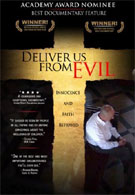By capturing events as they happen or investigating how they happened, a documentary can elevate its thematic importance through its immediately important content and raise questions that seem personally relevant to the viewer. Unfortunately, it’s an overlooked genre, due to being over stuffed with agendas and border-line propaganda. Although these filmmakers don’t step into the Michael Moore realm of propaganda, Deliver Us from Evil director Amy Berg is a self-proclaimed advocate, and her closeness to the material only pushes the audience away. Although religion is one of the two subjects you’re not supposed to discuss socially, it usually makes for an interesting documentary subject. When you throw pedophilia into the mix, you have a film that is a sure-fire Oscar nominee. In the hands of an unskilled director, unfortunately, Deliver Us from Evil's subjects never quite reach the importance that they should. First time director Amy Berg investigates a catholic priest’s near 30-year rampage of child molestation after it was excused, covered up and sometimes out-right denied by the Catholic Church.
Accused priest Oliver O’Grady is more villainous than any masked evil threatening to destroy the world. He’s a self-confessed child molester whose apologies seem empty and almost tongue-in-cheek. Obviously, a pedophile is never a sympathetic character and Berg takes advantage of the hatred toward O’Grady. Unlike Arnold and Jesse Friedman in Capturing the Friedmans (2003), O’Grady is never fleshed out as a dynamic character; he remains a one dimensional monster; not that he deserves any better. While Berg’s interviews with him in a church seek to elevate the thematic importance of what O’Grady is confessing, other interviews that take place across from a children-filled playground seek only to capitalize on our fears and disgust.
Even more difficult is the Catholic Church’s reaction to O’Grady’s behavior back in the 1970s. He was merely transferred to a different perish time and time again and never more than 60 miles away from his previous location. This is the type of Catholic corporate action that should infuriate, and while it does to some extent, it’s quickly and correctly surmised as the Catholic Church trying to keep things quiet and save face. Perhaps all the Catholic priest jokes and sickening newspaper headlines have led to a bit of desensitization because, today, the Catholic Church trying to maintain its holier than thou reputation is not shocking news. But it is still sad.
The saddest aspect of the film is the victims and their families’ loss of trust and hope. While it’s clear that they want the truth to be known, it doesn’t seem as if they are fully ready to tell their story. Berg never pressures them for information nor trivializes their stories and their pain is felt through and through. You can tell that when they open up or break down, it’s out of anger and pain, and it’s something that we feel a bit guilty watching.
No one ever said that pedophilia and religion are easy subjects to discuss and Berg does a tremendous job at keeping her own anger from spilling onto the screen. Instead of angering and motivating us, we are filled with sadness and disgust. Much of this is the result of letting her images connect with the viewer. While Berg has an eye for surface aesthetics, a shot of O’Grady’s fidgeting hands here and a wide shot of a church interior there, she fails to create any meaningful metaphors through her images, the kind that would have not only heightened the film’s thematic importance, but also served as a bridge for us to connect, in some way, with each subject.
As an advocate, Berg is clearly pointing a finger at the Catholic Church, but her tunnel vision ignores other important themes that are hardly explored. At one point, O’Grady explains the way in which he was molested by a priest as a young boy. That confession is perhaps the most humanizing interview with O’Grady, as it hints at the Church’s in-bred pedophilia, which is a much larger problem. Similarly, the victims’ never feel like the motivating focus, but are rather the argument against the Catholic Church. The thematic pieces of Deliver Us from Evil never feel settled, while its point of view charges ahead. For a documentary DVD release, Deliver Us from Evil fairs pretty well on the features side of things. But first, the film is presented in an anamorphic widescreen transfer of 1.85 : 1. As you’d expect, the majority of the film is crisp and clear; however, in some of the older video taped interviews, the image is grainy and distorted. That of course, is no fault of the DVD transfer. The film offers a Dolby Digital 5.1 soundtrack which serves its purpose.
In the way of features, the audio commentary with Amy Berg and producer and editor Matthew Cooke shows just how close to the material they are. Although they primarily speak of the Catholic Church’s travesties, Berg does share her experiences when filming, dealing with the Church, O’Grady and the victims. Both Berg and Cooke explain the difficult edits they had to make while going through hundreds of hours of footage. The track is somewhat interesting, but is really only recommend for fans of the film.
Your Daily Blend of Entertainment News
The DVD also offers seven deleted scenes and an “alternative ending,” which is actually just another deleted scene. Unlike fictional films, documentary deleted scenes are usually deleted because of time constraints, story focus or redundancy. Most of the deleted scenes are as interesting as the film, but were deleted to keep the story focused. It's unfortunate they didn't make it, since they add a sense of depth and feeling to the movie, especially to the victims’ story. Each deleted scene offers a commentary track that is mostly useless as the scenes speak for themselves.
The final feature the DVD is a look at how the Catholic church misconstrues excerpts from the Bible. This handful of reading and explanation of misinterpretation is largely out of place and is nothing useful. If you didn’t already know that the Church’s Biblical interpretations were strange at best, then this is a very boring way to discover it.

